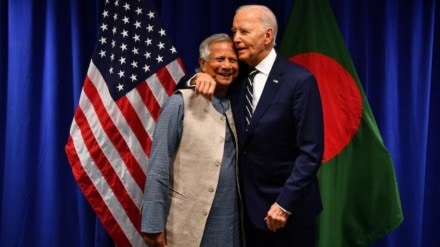Muhammad Yunus, Chief Adviser of the Bangladesh government, met with US President Joe Biden on Tuesday during the UN General Assembly session in New York. A press release from Yunus’s office indicated that Biden expressed full support for Bangladesh’s interim government.
During the meeting, the Nobel Peace Prize laureate emphasised the need for US cooperation in rebuilding Bangladesh. He informed Biden about the students who “rose against the tyranny of the previous government” and sacrificed their lives to pave the way for reconstruction efforts.
In addition to Biden, Yunus held discussions with several other leaders at the UN session, including World Bank President Ajay Banga and UN High Commissioner for Human Rights Volker Turk.
Yunus, a renowned economist and founder of Grameen Bank, was appointed as the chief adviser of the interim government on August 8, following former Prime Minister Sheikh Hasina’s resignation and departure from the country amid a violent, student-led uprising.
There have been allegations regarding US involvement in a regime change in Bangladesh, with Hasina alluding to American interference in the past. However, the White House has denied these claims, stating that the US government was not involved in the situation in Bangladesh.
On September 15, a high-level US delegation met with Yunus in Dhaka, assuring him of efforts to strengthen economic and political ties to foster a more equitable and inclusive future for the Bangladeshi people.
Significance of the meeting
The meeting between Yunus and Biden is important for a few key reasons. First, Biden’s support for Bangladesh’s temporary government shows that the US cares about stability and democracy there, which could help strengthen Yunus’s administration. This support also suggests that the US is ready to assist with rebuilding Bangladesh, possibly offering significant economic aid and development programs that are crucial for the country’s recovery.
Additionally, the discussions highlight the importance of strengthening economic ties, which could lead to trade agreements and investment opportunities vital for the country’s growth. The involvement of the UN High Commissioner for Human Rights emphasises the need for human rights advocacy during this political transition, signalling a collaborative effort to ensure their protection.
Moreover, Yunus’s engagement with Biden and other leaders enhances Bangladesh’s diplomatic relations and reinforces its position on the global stage. By recognising the role of student activism in the recent upheaval, the meeting may inspire further civic engagement among youth. Lastly, it helps address allegations of US interference in Bangladesh politics, promoting a narrative of partnership over intervention.
